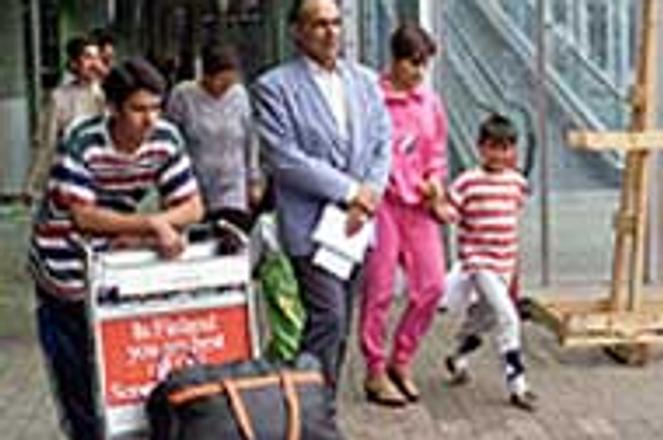A group of Slovak Romanies arriving in Helsinki this summer.photo: TASR
Exactly one month after lifting a requirement that Slovaks obtain visas to cross its borders, Norway reimposed the visa restriction on Slovakia on December 7. The move was blamed by both sides on the 219 Slovak Romanies who had arrived in Norway within a month of the November 7 cancellation to seek asylum.
Migrations of Slovak Romanies to other, principally EU countries, have prompted five nations - England, Ireland, Finland, Denmark and Norway - to slap visa restrictions on Slovakia since October 1998, while at least three more countries are now said to be weighing visas for Slovaks.
But instead of tarnishing Slovakia's international image before the crucial December 11 and 12 European Union summit in Helsinki, the Roma asylum requests have been dismissed by both foreign and domestic officials as unfounded, while the Roma's claims of discrimination have been rejected.
Slovakia's Roma minority feels strongly that its claims are not being taken seriously. According to Edmund Muller, director of the Central European Romany Education and Opportunity Centre in eastern Slovakia's Košice, "Slovak citizens are not prepared for a multicultural society. They don't like blacks, the Vietnamese, Jews - they only like themselves."
As a result, Muller said, the Roma are constantly subject to discrimination so intolerable that they will continue to leave Slovakia if changes are not made immediately.
"I would like to invite President [Rudolf] Schuster or Prime Minister [Mikuláš] Dzurinda to a Roma village so they could see what we have: dirt floors, sick children, no plumbing, no electricity, no food," Muller said. "Then I would ask them, 'If you lived here, wouldn't you ask for asylum somewhere else?'"
Government reaction
As the Norwegian government began to repatriate the Slovak Romanies - the first group of 15 flew back from Norway on December 5 - Slovak Foreign Affairs Minister Eduard Kukan said that more countries were considering visa regimes for Slovakia, including Luxembourg and Holland, who along with Belgium make up the 'Benelux' countries. If any of the three member states demand visas, he explained, the other countries are obliged to do the same.
Kukan added that he believed the Norwegian visa requirement would be temporary, and that it would not effect Slovakia's EU talks at the Helsinki summit. Andrej Sokolík, the Slovak Ambassador to Norway, agreed, saying that Norway had reluctantly called for the visas out of fear that Roma seeking asylum in Denmark would "sail to another Scandinavian country."
"Oslo has unfortunately been forced to defend itself against the undesirable influx of Slovak asylum seekers through this measure, however unpleasant it may be," Sokolík said. According to the Slovak press agency SITA, government officials from Denmark and Norway said that Slovakia was a "democratic country" and that the Roma asylum requests were "unjustifiable."
In Slovakia, Deputy Prime Minister for Minority Affairs Pál Csáky blamed the Roma departures on the generous conditions that western European countries offer asylum seekers. "As long as some EU countries provide cash assistance [to asylum seekers] well in excess of Slovakia's average wage, even in cases of clearly groundless requests for political asylum, there will always be people who abuse the imperfections of the system," he said.
For all the official denials that discrimination exists in Slovakia, the Roma seized on recent statements made by President Schuster as evidence that racial prejudices endured.
Schuster recently angered the Roma community with comments he made at the German Society for Foreign Politics forum in Bratislava when he said that the Roma themselves were to blame for their current state.
"The Roma have been profiting from government support, but they are unable to take responsibility for improving their own situation," the President said. "They are not aware of their own responsibility for the situation they now find themselves in and they don't want to change it."
"If we don't want to change it, why are so many Romanies leaving?" demanded Muller. "Slovaks have a complex against the Roma and as a result there has been a big revival of neo-Nazism. It is easy to say that a 'gypsy' is dirty, but it's not so easy to say why."
According to Muller, the only way to prevent the Roma from fleeing the country is to stop discriminating against them. To achieve this, Muller called on the government to adapt an affirmative action plan similar to that in the US.
"Affirmative action is the key to stopping the immigrations," he said. "We need more co-operation with the government and more tolerance from citizens. And we won't see this until we see Roma police officers, doctors, lawyers, members of parliament, even the first Roma Prime Minister or President."
Preventive measures
In October, 1998, England became the first western European country to implement visa requirements for Slovaks after the country received over 1,300 Slovak asylum seekers that year. Ireland soon did the same; both countries still require visas, but England has reported no further asylum requests.
On July 7, 1999, Finland became the third country to require visas after the arrival of 1,000 Roma. Norway began its visa restrictions on July 27, but cancelled them, as did Finland, on November 7. Denmark was the latest country to implement visas on November 30.
Other countries have addressed the problem differently. Switzerland, for example, sent all Romanies not possessing a return flight ticket and 100 Swiss francs per person per day back to Slovakia immediately upon their arrival. The Swiss border police told Czech Airlines that if any more asylum seekers arrived via the airline, the latter would have to pay their return expenses.
Until the latest month of migrations, Finland had recorded the highest number of asylum seekers from Slovakia (1,150), followed by Belgium (224), Denmark (215), Sweden (124), Switzerland (85), Norway (68), the Netherlands (44), Austria (11), and Ireland (7).


